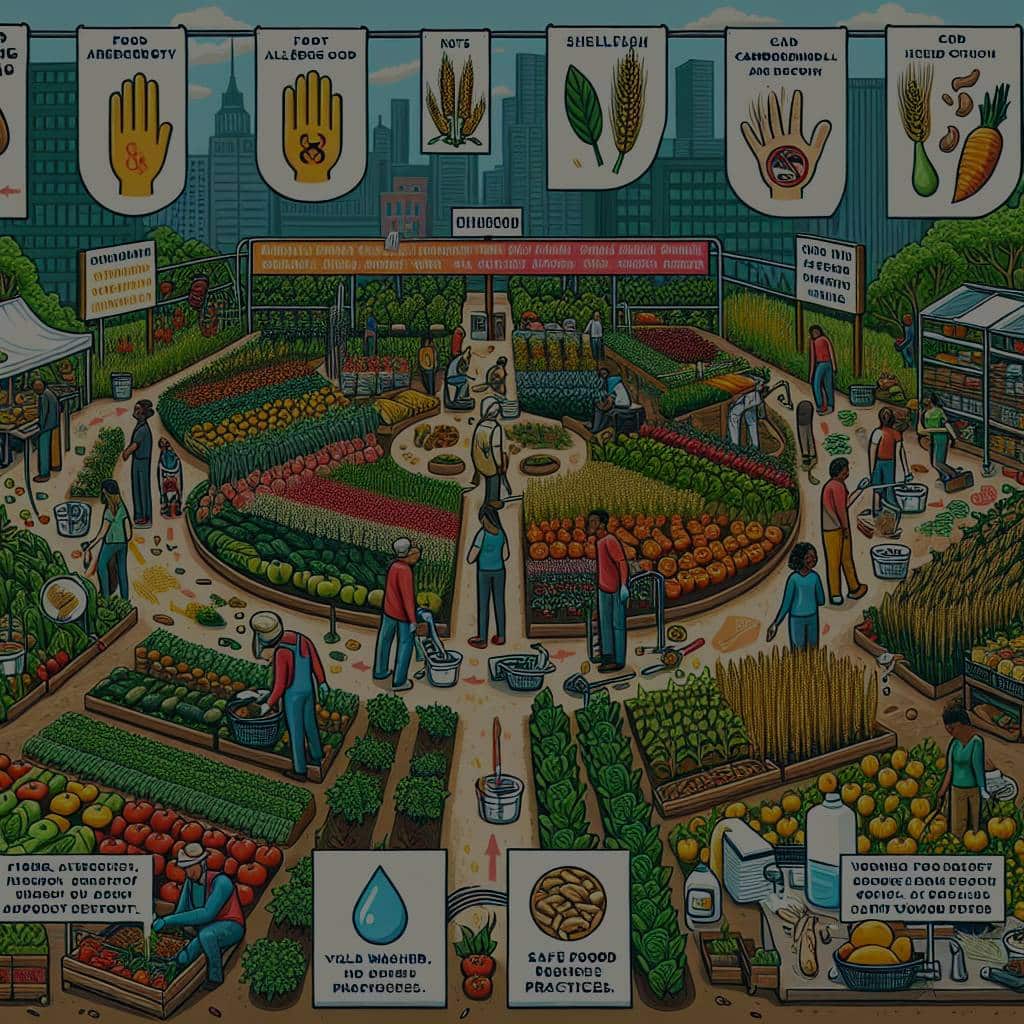In an era marked by rapid urbanization and an increasing preoccupation with health and wellness, the concept of urban agriculture is gaining traction. More than just a reaction to the encroachment of the concrete jungle, urban agriculture is a proactive endeavor. It is an attempt to reconnect with the roots of food production. And this reconnecting has implications far beyond the mere growing of crops. It can also serve as a tool for promoting food allergy awareness and safe food practices. Indeed, by bringing food production closer to home, urban agriculture can help consumers better understand what they eat and how it affects their health.
Urban Agriculture: A Brief Overview
Urban agriculture refers to the practice of cultivating, processing, and distributing food within or around cities. This might involve growing crops in backyards, community gardens, or even rooftop gardens. It can also include animal husbandry, aquaculture, agroforestry, and horticulture. The aim is to make the city more self-sufficient and to cut down on the distance that food travels from farm to plate.
Have you seen this : Does the Use of Ergonomic Furniture in Schools Improve Student Focus and Physical Health?
A study conducted by Google Scholar and Crossref pointed out that urban agriculture could significantly contribute to local food security and healthy nutrition, particularly in cities challenged by rapid urbanization and population growth. Despite their concrete and steel landscape, cities like these still have the potential to produce their own food, reducing dependence on the global food supply chain.
The Role of Urban Agriculture in Food Allergy Awareness
Food allergies have become a major concern across the globe, with more people suffering from a range of allergic reactions to different foods. The MDPI journal points out that this is not just a health issue but also a social and economic one. It impacts individuals’ quality of life and can impose a significant financial burden on families and healthcare systems.
Have you seen this : Can Community-Based Peer Support Programs Alleviate Postpartum Depression?
However, the reality is that many consumers are ignorant about food allergies. This is where urban agriculture comes in. By bringing food production closer to consumers, it can play an essential role in promoting food allergy awareness.
When you cultivate your own foods, you have a better understanding of the ingredients that go into your meals. This could be particularly beneficial for those with allergies, as they can ensure that the foods they are allergic to are not present in their garden. Urban agriculture could also help to educate consumers about the potential allergens in different foods, fostering a culture of food safety and care.
Urban Agriculture and Safe Food Practices
Beyond promoting food allergy awareness, urban agriculture can also support safe food practices. As you are directly involved in the process of growing your own food, you have complete control over the methods used. This can range from choosing to avoid certain pesticides to implementing organic farming methods.
Moreover, urban agriculture can help reduce the risk of foodborne diseases. It has been observed that food products are often contaminated during transportation and storage. With urban agriculture, the chain of food production and distribution is significantly shortened. This means that the risk of contamination is also reduced, ensuring the safety of the food consumed.
Urban Agriculture in Schools: A Double-Edged Sword
Incorporating urban agriculture into school environments is an excellent way of educating young scholars about food safety and allergies. Children can learn about the importance of agriculture, the process of growing food, and the potential allergens that some foods may contain.
However, this also poses a risk. Children with food allergies could be exposed to allergens during these activities. It is therefore crucial to ensure that safety measures are in place. This could include having an allergen-free garden or, at the very least, clearly marking plants that could trigger allergies.
The Future of Urban Agriculture and Food Safety
As urban agriculture continues to grow and evolve, so does its potential to transform our understanding and practice of food safety. Technological advancements and increased research in the sector will likely make it more efficient and safer. For example, the use of sensor technology can help urban farmers monitor their crops for signs of disease or pest infestation, allowing them to take swift action before the problem becomes severe.
The role of urban agriculture in promoting food allergy awareness and safe food practices cannot be understated. As more consumers become urban farmers, they become more aware of what they are consuming and how it impacts their health. This not only contributes to individual wellbeing, but it also promotes a healthier, safer society.
Enhancing Public Health through Urban Agriculture
The concept of urban agriculture is not only a response to the global food crisis but also an innovative approach to enhancing public health. It’s crucial to understand that the food we eat directly affects our health and wellness. As urban agriculture brings food production closer to home, it allows consumers to have a better understanding of their food from farm to plate.
Urban agriculture supports food safety by giving urban farmers the ability to control their own food production. With the increase of food allergies reported in the United States, there’s a heightened need for education and awareness about potential allergens. Urban agriculture provides an excellent platform for this.
Through the cultivation of their own food, consumers can ensure that the foods they are allergic to are not present in their garden or meals. This is particularly beneficial for low-income households who may not always have the means to purchase allergen-free foods. By growing their own produce, these families can ensure their meals are safe and nutritious.
Additionally, urban farming practices can also contribute to reducing the risks associated with foodborne diseases. Often, food products get contaminated during the process of transportation and storage. However, in urban agriculture, the chain of food production and distribution is significantly shortened. This minimizes the risk of contamination, ensuring the safety of the food consumed.
Conclusion: Urban Agriculture – A Step towards a Safer Food Future
In conclusion, urban agriculture plays a significant role in promoting food allergy awareness and safe food practices. It brings consumers closer to their food, promoting a culture of food safety and care. Furthermore, it’s a potent tool in our fight against the global food crisis, especially in rapidly urbanizing cities.
The future of urban agriculture looks promising. With technological advancements like sensor technology, urban farmers can effectively monitor their crops for signs of disease or pest infestation. This allows them to take swift action, ensuring the health of their crops and, ultimately, the consumers.
The rise of urban agriculture is not just about producing food within city limits. Its true potential lies in its ability to transform our food production and consumption habits, leading to greater food safety, public health, and a more sustainable future. As more consumers become urban farmers, they become more aware of what they are consuming and how it impacts their health, leading to a healthier, safer society.
The importance of urban agriculture in promoting food allergy awareness and safe food practices can’t be overstated. Indeed, it’s a critical part of a broader movement towards a healthier, safer, and more sustainable future. Given these benefits, support for urban agriculture should be a key priority for policy-makers, urban planners, and community leaders alike.






